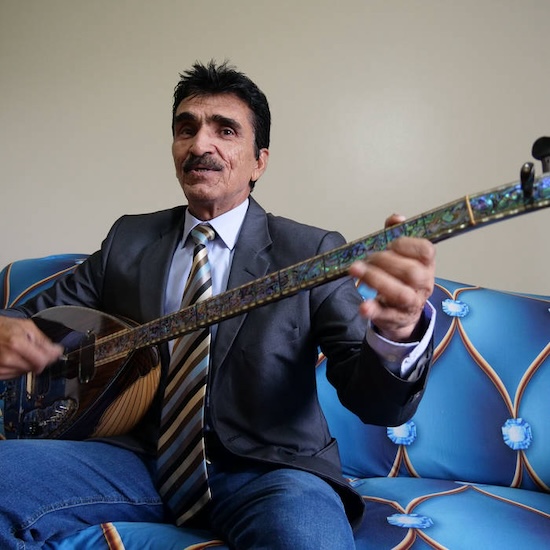The story behind Mohammad Syfkhan’s I Am Kurdish is as extraordinary as the music within – maybe even more so – though it’s certainly not a story without precedent. The Syrian Kurdish singer and musician’s experiences have been similar to thousands of others, and many more thousands who haven’t been quite as lucky – and I say that in spite of the horrors he has had to endure.
Mohammad Syfkhan grew up in Raqqa, and from the 1980s onward, he split his time between working as a surgical nurse and singing and playing the bouzouki in a popular wedding band called The Al-Rabie Band. In 2011, war broke out in Syria and one of Mohammad’s sons was brutally murdered by ISIS. Threatened with more of the same, he and his family were forced to flee, making dangerous crossings in rubber boats to seek sanctuary from almost certain death. Three of his sons stayed in Germany while Mohammad has made a new life for himself in Ireland with his wife and daughter since 2016.
You can read more about Syfkhan’s assimilation into Irish life in this excellent feature from Quietus editor John Doran, though to cut a long story short, his deft, nimble bouzouki playing didn’t go unnoticed for long. Mohammad has got on with playing private parties and functions, weddings and events for the Kurdish and Syrian communities, and in 2023, he supported Lankum at the Cork Opera House playing to around 1,000 people.
And now comes his immensely impressive debut solo album, recorded in County Wicklow with musicians including County Sligo saxophonist Cathal Roche and Cork-based cellist Eimear Reidy. I Am Kurdish takes his domestic influences and fuses them with music from beyond those regions, from North African folk rhythms to Turkish psychedelia. It’s a glorious alembic not bound by borders, where Mohammad himself brings a cultivated exuberance to his playing that belies his vintage.
Not being versed in Aramaic languages myself, it would be tempting to project onto the singer my own suppositions of what he might be trying to convey – world-weariness, gratefulness, humility, defiance? – though perhaps the best way to tackle I Am Kurdish is to put his story aside and look at the music itself. The title track, of course, deals with identity, and I’m reliably informed that Syfkhan wrote about the tragedy he and his family experienced, while also using the song to give thanks for having come through the horrors of a decade ago. Though more importantly perhaps – given that so many of the people who hear it won’t understand it either – ‘I Am Kurdish’ bangs (albeit in a dignified, upstanding kind of a way – these songs rarely exceed 120 bpm, though that doesn’t mean they’re not engineered to make you dance). Rooted to a sonorous bass drum, the chords of ‘I Am Kurdish’ or ‘Az Kardam’ levitate around the same bass note, as Mohammad’s vocalese alternates with the bouzouki, breaking out all by itself and striking up a memorable motif. Opener ‘Do You Have A Lover Or Not’, a song written by Radwan Abdullah, should almost certainly inspire people to rise from their seats and move to the Dabke rhythms regardless of their relationship status.
And then there are dolorous, almost klezmer-like moments, too, on the instrumentals ‘Do Not Bow’ and ‘A Thousand And One Nights’, featuring drawn out, contemplative reeds, delivering an emotional kick to balance out the more celebratory moments. It’s a beautiful debut featuring the original title track and seven standards that you may or may not be familiar with, from an artist who has accrued a whole wealth of musical and life experience a world away in the Syrian Arab Republic. Syfkhan has been lucky, and it’s the luck of the Irish to get him too.


